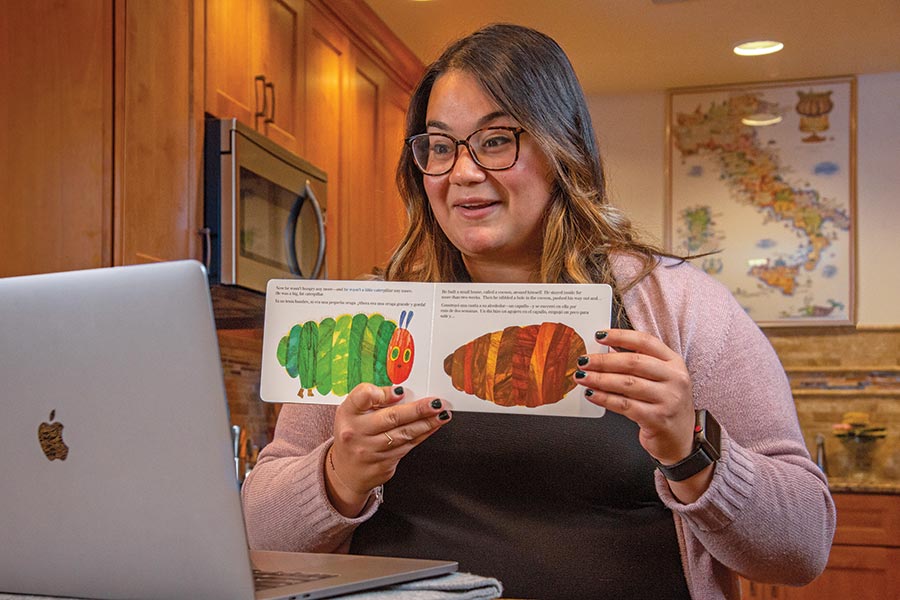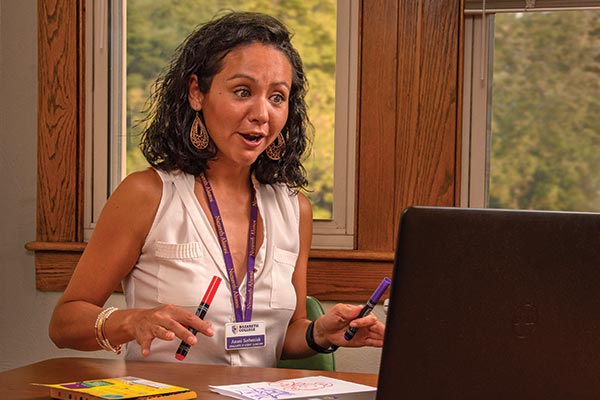ACADEMICS
Alumni to the Rescue
Students not only complete practicums but gain new skills during the pandemic.
by Sally Parker

Two sides of the screen: Mary Lugo '15, '17G (above) volunteered to help Anani Serbeniuk '18, '20G (below) complete her practicum remotely after the COVID-19 pandemic caused student-staffed clinics to close in March.
Anani Serbeniuk ’18, ’20G, was in the middle of a rewarding practicum as a speech-language pathology graduate student in March when the bottom fell out.
She was working with geriatric clients in Nazareth’s Neurogenic Communication and Cognition Clinic, honing skills in treating disorders that were new to her. When the COVID-19 pandemic hit, the clinic closed abruptly.
That was a two-way loss. “As a clinician, it’s about the relationships you build and what you get from the individual, not just what they get from you,” Serbeniuk says. “All of a sudden that’s ripped out of your hands. Not having that closure with them was the most upsetting.”
The pandemic bumped 43 graduate students out of practicums, throwing graduation into question. Students must earn 400 clinical hours — many of those in the final spring and summer — to finish the program.
“I was honestly really stressed,” Serbeniuk recalls. “We didn’t know how we were going to complete those hours. If you don’t complete them, of course you can’t graduate.”
The department was fast to react, moving classes and simulation experiences online and emailing alumni around the country to ask for help providing practicum alternatives using online video platforms.
Eighteen alumni answered the call. There were challenges in the new modality: lack of familiarity with the technology, varying levels of client access, interruptions in service. But the biggest obstacle — adjusting in-person therapy models to distance applications — opened doors to new approaches.
“I’m a very in-the-moment, play-based, experiential therapist,” says Brittany Hughes ’14, ’16G, whose work on language and speech skills with deaf and hard of hearing students at the River School in Washington, D.C., went virtual in March. Keeping children engaged online requires a bag of tricks. Fortunately, Hughes’ intern, Lauren Vigue ’19, ‘19G, was a natural planner who mined the internet for online games, books, and activities for themed lessons every week.
Amanda Wright ’17G was working as a speech therapist in a South Carolina nursing facility when she supervised Sarah Lenoir ’20G. Overseeing Lenoir as she helped geriatric patients with eating and swallowing was difficult over Zoom, but the pair made it work. Some of Lenoir’s other patients worked on cognitive skills and looked forward to the sessions.
“They did so well with it. I just put Sarah [on the laptop] on the table in front of them and they worked with her [via video conference],” Wright says.
Mary Lugo ’15, ’17G, a bilingual speech pathologist in the Rochester City School District, worked over Zoom with Serbeniuk primarily with the parents of Spanish-speaking children under 3 at Rochester Hearing & Speech Center.
Doing therapy with children this young isn’t feasible on video calls because of their shorter attention span. So Lugo and Serbeniuk coached their parents instead, walking them through strategies to stimulate language at home. The results were eye-opening.
“If we were just going into the day care centers, that wouldn’t happen,” Serbeniuk says. “That was the best thing — to work so closely with those families and educate them on their important role in language development.”
Participants say Nazareth prepared them to pivot quickly under intense pressure. They discovered humor, collaboration, and a willingness to play with new ideas.
“The higher level of thinking they forced us to do — when it came time to do it in the real world, I could pull on my experience from that,” Hughes says.
“I was really happy that I did it,” Lugo adds. “I’m glad I listened to the email.”
Sally Parker is a Rochester-based freelance writer.
